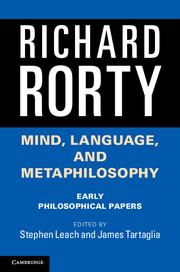Book contents
- Frontmatter
- Contents
- Foreword
- Acknowledgments
- Introduction
- 1 Pragmatism, categories, and language
- 2 The limits of reductionism
- 3 Realism, categories, and the “linguistic turn”
- 4 The subjectivist principle and the linguistic turn
- 5 Empiricism, extensionalism, and reductionism
- 6 Mind-body identity, privacy, and categories
- 7 Do analysts and metaphysicians disagree?
- 8 Incorrigibility as the mark of the mental
- 9 Wittgenstein, privileged access, and incommunicability
- 10 In defense of eliminative materialism
- 11 Cartesian epistemology and changes in ontology
- 12 Strawson’s objectivity argument
- 13 Verificationism and transcendental arguments
- 14 Indeterminacy of translation and of truth
- 15 Dennett on awareness
- 16 Functionalism, machines, and incorrigibility
- Index of names
- References
Introduction
Published online by Cambridge University Press: 05 June 2014
- Frontmatter
- Contents
- Foreword
- Acknowledgments
- Introduction
- 1 Pragmatism, categories, and language
- 2 The limits of reductionism
- 3 Realism, categories, and the “linguistic turn”
- 4 The subjectivist principle and the linguistic turn
- 5 Empiricism, extensionalism, and reductionism
- 6 Mind-body identity, privacy, and categories
- 7 Do analysts and metaphysicians disagree?
- 8 Incorrigibility as the mark of the mental
- 9 Wittgenstein, privileged access, and incommunicability
- 10 In defense of eliminative materialism
- 11 Cartesian epistemology and changes in ontology
- 12 Strawson’s objectivity argument
- 13 Verificationism and transcendental arguments
- 14 Indeterminacy of translation and of truth
- 15 Dennett on awareness
- 16 Functionalism, machines, and incorrigibility
- Index of names
- References
Summary
Richard Rorty published six volumes of his own selections from the papers he wrote between 1972 and 2006. Together with his two monographs, these now provide the main source for his views, and scholars may debate at leisure whether some of the papers Rorty did not select have been unjustly neglected as a consequence. However, it seems clear to us that there is a large body of Rorty’s work which has most certainly been unjustly neglected: the early work. For before he wrote “The World Well Lost,” the 1972 paper that opens Consequences of Pragmatism, Rorty was already an influential philosopher. Many still fondly recall this first phase of his career, and we have often heard say that Rorty was an excellent analytic philosopher back in the 1960s and early 1970s before he read some continental philosophy, became a postmodernist, and consequently went off the rails. Almost everything about this latter view is wrong, but there is nevertheless a kernel of truth to it. This is that Rorty wrote some classic papers in the 1960s and early 1970s which, for better or worse, would probably be of more interest to the average contemporary philosopher working on mind or language than his mature manifesto of replacing objectivity with solidarity and metaphysics with literature. But given that Rorty’s thinking never did radically change direction, there is also plenty to be found here for those interested in the mature Rorty. To neglect the papers in this volume is, in short, to neglect innovative ideas which retain their interest and relevance, as well as a significant part of the career of a highly significant thinker – the part you might well find you like best. The early Rorty has been languishing in old journals, obscure collections and faded memories for too long!
- Type
- Chapter
- Information
- Mind, Language, and MetaphilosophyEarly Philosophical Papers, pp. 1 - 15Publisher: Cambridge University PressPrint publication year: 2014



